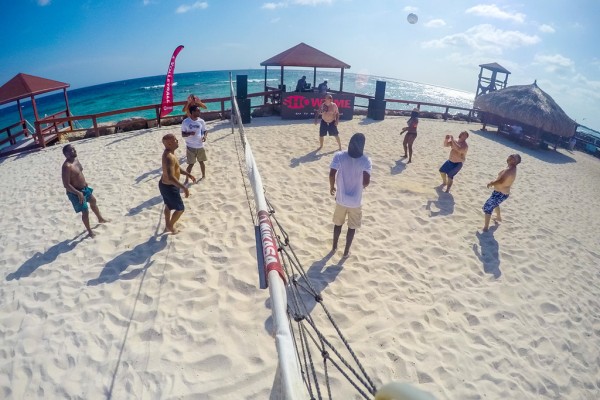 Who wouldn’t love the chance to travel to beautiful Lanai, Hawaii, for a five-day celebration of your hard work? A trip that incorporates the theme of “A Royal Legacy” where you were quite literally treated like royalty? Well that’s just what we did for one of our client’s President’s Club. Few people would pass up the opportunity to have a free trip to an exciting or new location, and we understand how motivating it can be for employees when they realize that meeting their goals could end in a fabulous trip. There are various forms of non-monetary compensation that can incentivize your business objectives, but compensation in the form of incentive programs and trips is growing in popularity, especially among younger workers who value experiences over cash.
Who wouldn’t love the chance to travel to beautiful Lanai, Hawaii, for a five-day celebration of your hard work? A trip that incorporates the theme of “A Royal Legacy” where you were quite literally treated like royalty? Well that’s just what we did for one of our client’s President’s Club. Few people would pass up the opportunity to have a free trip to an exciting or new location, and we understand how motivating it can be for employees when they realize that meeting their goals could end in a fabulous trip. There are various forms of non-monetary compensation that can incentivize your business objectives, but compensation in the form of incentive programs and trips is growing in popularity, especially among younger workers who value experiences over cash.
Quick Links
- What Is Non-Monetary Compensation?
- Do Employees Value Non-Monetary Compensation?
- Should Businesses Value Non-Monetary Compensation?
- Best Options for Non-Monetary Compensation
- How to Motivate Employees with Destination Events and Incentive Trips
What Is Non-Monetary Compensation?
By definition, non-monetary compensation is any non-cash compensation. Technically, your employees are already receiving non-monetary compensation in the form of any benefits you provide. These may include health care, extra days off, child care, technology, and even a stocked fridge with snacks in the breakroom. Though the kind of compensation varies widely, as we stated previously, incentive programs and trips are a favorite among many.
Do Employees Value Non-Monetary Compensation?
For decades, cash compensation was king. Bonuses were a primary driver for employees and were an easy way for employers to reward desired behavior. However, recent research has found that 65% of employees would actually prefer non-monetary compensation.
One of the reasons non-cash rewards leave a greater impression is that cash bonuses are more likely to be spent on bills and ordinary expenses. The cash incentive gets lost in the shuffle of other spending, and the employee doesn’t necessarily associate that extra money with their performance or business goals.
Further, employees value their performance being recognized by their peers. Celebrating high performers with public events and trips allows the recognition to be public. Similarly, as part of your team building process, you want to share successes and accomplishments. While employees are unlikely to spread the news of a bonus and its value, the opposite is true when it comes to receiving a trip or a high-end luxury item. Sharing the details of non-monetary compensation is much easier and provides an indirect way to talk about achievements.
Should Businesses Value Non-Monetary Compensation?
As we all know, helping employees feel appreciated improves employee loyalty. Associates who feel valued are also more likely to go above and beyond in the workplace. Unlike bonuses, non-monetary items are viewed as gifts, not compensation. As a result, the incentives are better at helping establish and solidify relationships between managers and employees.
Offering non-monetary compensation (such as trips, experiences, concert tickets, or high-tech swag) should be based on situations, employees, and your company’s desired outcomes. The bottom line is you need to reward your employees for their hard work and dedication in order to increase engagement, productivity, job satisfaction, and company loyalty. After all, it’s the people who work for you that are the heart of your company, and they can make or break your business. Showing your appreciation is crucial to future growth.
 Best Options for Non-Monetary Compensation
Best Options for Non-Monetary Compensation
Finding creative ways to reward your employees with non-monetary compensation doesn’t have to be difficult. One of the best features of these incentives is that they are adaptable. More specifically, the reward can be matched to the goal or achievement. Obviously, an achievement that took months to accomplish should not be rewarded in the same manner as one achieved quickly. Fortunately, non-monetary compensation can be adjusted to reflect the magnitude of the accomplishment.
1. Time
Time may not be the first kind of compensation that comes to mind, but giving employees time off to do things they love is a true gift. Gifts of time can include flexible work schedules, time set aside for professional or personal development, time for pet or passion projects, set time to volunteer, and additional vacation days (or unlimited if you’re like us at Bishop-McCann!).
2. High-tech gifts
Physical gifts (especially high-demand, high-tech gifts) are popular. From large televisions and tablets to Apple watches and iPhones, consider what your employees might want most. It may be a new gaming system, noise-canceling headphones, or other tech gifts related to their job or personal habits. But consider your choice carefully with this kind of non-monetary compensation. Understand that everyone is different, so it may be beneficial to give employees options to choose from in order to personalize the gift.
3. Other tangible gifts
Physical gifts don’t all need to be high-tech. In fact, one of the best ways to create value for your employees is to personalize a gift to demonstrate that you value them. These gifts can include everything from meals to personalized gift baskets. Again, be sure to understand who will be receiving the gift to ensure that it will resonate with the recipient in a way that makes them feel as if you considered their personal tastes and preferences.
4. Experiences
The gift of experiences is growing in popularity, and like the above listed tangibles, they offer an opportunity to show how well you know your team. Options include event tickets (theater or concerts), classes or workshops, meals (think upscale restaurants), or even a massage or spa day. These experiences may not be something that your employees would normally spend money on, but when you offer them as an added bonus, the incentive enables them to participate in these activities guilt free.
5. Trips and travel
Incentive trips and travel offer significant ROI as a non-monetary reward for exceptional performance. Not only do your employees enjoy the trip while they are there, but they’ll be sure to talk about it long after it’s over. The experience will motivate them and other employees to meet goals in order to qualify for future incentives. Further, speaking about the trip is a way for employees to enjoy public acknowledgment of their accomplishments as well.
One of the biggest concerns with incentive travel is the logistics of air travel and managing event planning. This is why hiring an event planning company is such a good idea. Planners can take the pressure and stress off your team, allowing them to enjoy time with colleagues and co-workers. In fact, the right event planning team can provide your organization with the gift of travel and time.
 How to Motivate Employees with Destination Events and Incentive Trips
How to Motivate Employees with Destination Events and Incentive Trips
Successful incentive programs like destination events and trips can motivate your employees. However, there are a few essential elements to consider to ensure you achieve your goals.
1. Choose the right destination
While traveling to exotic destinations can be both exciting and relaxing, you can choose the right location for your incentive program without sending your guests to a beach. The primary goal in choosing your destination is selecting a location that your attendees would not ordinarily get to experience. Further, the right destination is about more than the geographic location. You’ll also want to choose the right hotel or venue, which can add a special element to any trip as well.
2. Highlight off-site events or activities
Off-site events and experiences have the potential to truly drive motivation. While travel destinations may pique someone’s interest, additional activities, especially those that may only be available in a specific location, can really motivate employees to achieve the goals you’ve set. For example, Niagara Falls is a well-known destination, but it’s one that many may not choose on their own. Add an amazing opportunity like ziplining over the falls to the beauty of this natural wonder, and you’ll elevate your incentive with a unique activity that most will never get to experience.
3. Market the incentive
Simply put, an incentive trip doesn’t have much power to motivate if no one is aware of the program. While an initial announcement is great, consider marketing it as you would any other event. Email reminders, employee newsletters, team meetings, and public spaces are perfect opportunities to make your employees aware of the program.
4. Carefully plan your event
The best thing you can do to motivate your employees is to have a successful corporate event that has memorable experiences that they’ll want to discuss with others. Once you’ve produced an exciting incentive program that everyone is talking about in the office when they return, the next one you plan is sure to motivate your entire team. Working with an event planning company with significant experience producing incentive travel and destination meetings and events is one way to ensure you have a successful event.
Finding ways to both retain and motivate employees doesn’t need to be challenging, especially when you find the right partner. Non-monetary compensation is proving to be the best option to reward employees for achieving goals and hitting milestones.
If you’re ready to start planning an incentive trip or destination meeting, get in touch with the JOY creators at Bishop-McCann! We have the experience and expertise to help you deliver the kind of event your employees deserve and will talk about for years to come.

